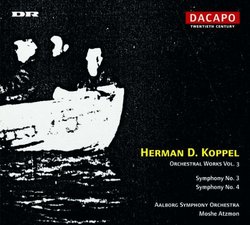| All Artists: Herman D. Koppel, Moshe Atzmon, Ålborg Symphony Orchestra Title: Hermann D. Koppel: Orchestral Works, Vol. 3 Members Wishing: 0 Total Copies: 0 Label: Da Capo [Naxos] Original Release Date: 1/1/2000 Re-Release Date: 1/20/2004 Genre: Classical Style: Symphonies Number of Discs: 1 SwapaCD Credits: 1 UPC: 636943601624 |
Search - Herman D. Koppel, Moshe Atzmon, Ålborg Symphony Orchestra :: Hermann D. Koppel: Orchestral Works, Vol. 3
 | Herman D. Koppel, Moshe Atzmon, Ålborg Symphony Orchestra Hermann D. Koppel: Orchestral Works, Vol. 3 Genre: Classical
|
Larger Image |
CD Details |
CD ReviewsStunningly powerful music G.D. | Norway | 11/10/2009 (5 out of 5 stars) "Herman Koppel (1908-98) belongs to the group of composers that included Holmboe, Bentzon and Høffding. Holmboe is the most famous of them, but this Dacapo series of his orchestral music shows that Koppel is at least his equal. Stylistically, one can imagine a cross between Carl Nielsen and Prokofiev, but slightly more modern in sound (Tubin might be a point of reference as well), but the two works here are however far more pensive and troubled than one usually associates with the composer. They are no less rewarding, however - in fact, I won't hesitate to place them among the very greatest symphonies of the twentieth century!
The third symphony is quite simply a masterpiece. It is cast in one continuous movement and is based on two motivic ideas, one restless, shadowy and dark motif searching around in the lower strings and a mournfully melodic theme presented by a variety of instrumental groups. After the restless theme is first given, the mood of the work gradually intensifies as it moves through various increasingly dramatic episodes, always with the restless theme hovering in the background or as the inevitable point where the music has to return, no matter how much it tries to break free. The work ends in a truly staggering climax, but resides back into the desolation of the restless theme. This is the kind of powerful, expertly and imaginatively constructed music that leaves the listener almost overwhelmed - a truly great experience. The fourth symphony is cast in three movements; the first is based on a rhythmic pulse rather than a theme that gradually builds momentum (although it is juxtaposited with more quiet and reflective material) to a staggering, violent culmination before receding, giving way to a marvelous and superbly scored scherzo, raucously buoyant but spiteful and threatening; the final movement is explorative, beset by uncertainty and sounds as if it is constantly looking for its direction before moving towards a powerful close. Maybe the third is the more impressive - a genuine masterpiece - but the fourth is still a magnificent work. It is a pity they are not better known, but at least they benefit from the excellent playing of the Aalborg Symphony Orchestra here, and are convincingly directed by Moshe Atzmon. Sound quality is good as well, and this is really a fabulous release, urgently recommended." |

 Track Listings (4) - Disc #1
Track Listings (4) - Disc #1